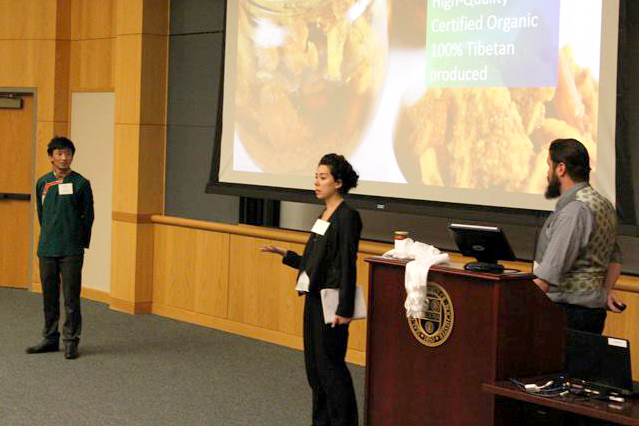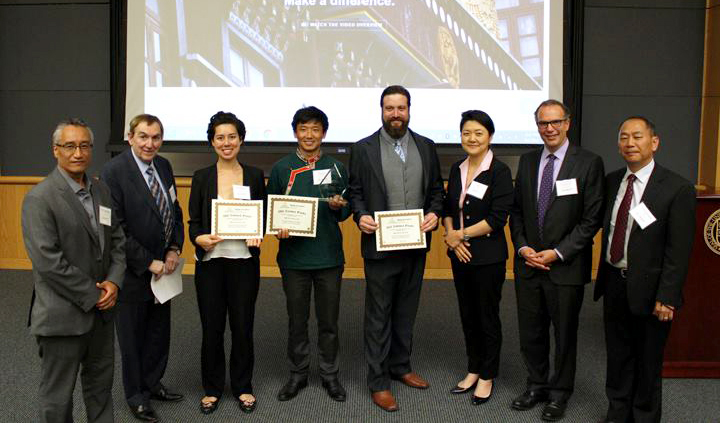On June 3, three Heller students earned second place in the Tibetan Innovation Challenge held at the University of Rochester. Utilizing the imagination of universities around the world, this intercollegiate competition encourages student teams to create adaptable business plans that find creative solutions to problems facing Tibetan refugee communities in India. In being awarded second place, Heller students April Nishimura, MA SID/MBA’17, Aaron Cooper, MA SID’17 and Kirti Kyab, MA SID’17, earned a $2,500 cash prize for their business plan for an organic pickling company called FarmTibet. The FarmTibet team spoke with Heller Communications about the experience.

The FarmTibet team presents their business plan. From left to right: Kirti Kyab, MA SID’17, April Nishimura, MA SID/MBA’17, Aaron Cooper, MA SID’17.
Heller Communications: Why did you decide to compete in the Tibetan Innovation Challenge?
FarmTIbet: We believe that lean, community-based enterprises with a social mission are an effective tool to empower marginalized communities. More than simply economic development, an enterprise that taps into local strengths in an organized way is a foundational building block of sustainable development. The competition also gave us the opportunity to see how other people are thinking about social entrepreneurship by seeing other business plans and speaking with mentors and the judging panel about their experiences in the field.
Developing countries suffer from "brain drains" as their youth move away to cities or other countries in search of better opportunities, while the communities back home lose the human capital that could have been. Not everyone is an entrepreneur, but a community benefits from the success of small, inclusive enterprises. Joining this competition was a step in understanding how to bring these small enterprises to communities that need them.

The FarmTibet team members are presented with their second place award in the Tibetan Innovation Challenge.
HC: Tell us about your business idea. How will Farm Tibet improve the lives of Tibetan people?
FT: FarmTibet is a cooperative agricultural society that specifically produces pickled products and preserves such as achar, a popular South Asian condiment often made from unripe mangoes preserved with chilis and other spices. Very recently the Indian government deregulated the pickling industry, opening it up to larger manufacturers. Additionally, consumer trends show that there is more interest in finding organic products in this region.
The primary source of income for Tibetan settlements is agriculture. FarmTibet will build a facility in the settlements to process the raw fruit into pickled achar and distribute the product to the regional market. The facility will be a cooperative model in which farmers are members with a voting stake in local operations. As the facility grows to capacity, new facilities will be opened in other settlements with their own cooperative structure to make decisions within that region under the FarmTibet quality standards.
We believe that the benefit of FarmTibet is that it builds off the strength and values of the community, giving the members agency to build the business within the region. It taps into what is essential to the values of Tibetan culture, and reinforces a sense of community. The model is also adaptable for different regions as the brand expands.
HC: What's next for the Farm Tibet team?
FT: It is going to take a lot more research to get FarmTibet off the ground. While we stand behind the concept, we did not benefit from being in the field to see the situation firsthand. That said, a cooperative model could be used in all sorts of situations. Aaron is currently using an adapted model to form an agricultural cooperative community center in central Maine, where farmers are not coordinated and they suffer from not having a local market to sell their products.
As for the team, we are looking for future competitions where we can put our heads together. Perhaps one day we will create a business plan to pursue. Each member of the team has expressed interest in social entrepreneurship. Whether or not we continue as a team we still share a strong desire to develop socially oriented enterprises in struggling communities.
The video below represents Team FarmTibet's qualifying entry for the 2016 Tibetan Innovation Challenge Finals.
